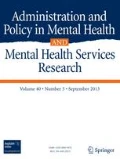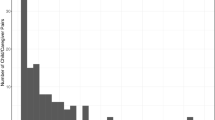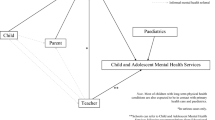Abstract
We compared parents’ endorsement of having contacted a “mental health clinic or agency” when seeking help for their child, with parents’ recognition of having contacted specific, named mental health agencies in their geographic region. Data were from two studies involving parents of children and adolescents seeking mental health services. Across the two studies, only 28 and 41% of parents reported having contacted a “mental health agency,” but 100% reported contact when asked about specific agencies by name. Incorporating this simple modification in future studies could provide more accurate documentation of help-seeking for, and utilization of, children’s mental health services.
Similar content being viewed by others
References
Ascher, B. H., Farmer, E. M. Z., Burns, B. J., & Angold, A. (1996). The Child and Adolescent Services Assessment (CASA): Description and psychometrics. Journal of Emotional and Behavioral Disorders, 4, 12–20.
Bean, D. L., Leibowitz, A., Rotheram-Borus, M. J., Horwitz, S. M., Jordan, D., & Hoagwood, K. (2000). False-negative reporting and mental health services utilization: Parents reports about child and adolescent services. Mental Health Services Research, 2, 239–249.
Belli, R. F., Schwarz, N., Singer, E., & Talarico, J. (2000). Decomposition can harm the accuracy of behavioural frequency reports. Applied Cognitive Psychology, 14, 295–308.
Bhandari, A., & Wagner, T. (2007). Self-reported utilization of health care services: Improving measurement and accuracy. Med Care Res Rev, 63, 217–235.
Boyle, M. H., Offord, D. R., Hofmann, H. G., Catlin, G. P., Byles, J. A., Cadman, D. T. et al. (1987). Ontario Child Health Study, I: Methodology. Archives of General Psychiatry, 44, 826–831.
Burns, B. J., Angold, A., Magruder-Habib, K., & Patrick, M. K. S. (1997). The Child and Adolescent Services Assessment (CASA)—Version 4.2. Durham, NC: Duke University Medical Centre.
Burton, S., & Blair, E. (1991). Task conditions, response formulation processes, and response accuracy for behavioral frequency questions in surveys. Public Opinion Quarterly, 55, 50–79.
Cunningham, C. E., Pettingill, P., & Boyle, M. (2002). The Brief Child and Family Phone Interview (BCFPI-3)—A Computerized Intake and Outcome Assessment Tool: Interviewers Manual (Rep. No. March 2002). Hamilton, ON: Canadian Centre for the Study of Children at Risk, Hamilton Health Sciences.
Epstein, M. H., Kutash, K., & Duchnowski, A. (1998). Outcomes for children and youth with behavioral and emotional disorders and their families: Programs and evaluation best practices. Austin, TX: Pro-Ed.
Fendrich, M., Johnson, T., Wislar, J. S., & Nageotte, C. (1999). Accuracy of parent mental health service reporting: Results from a reverse record-check study. Journal of the American Academy of Child and Adolescent Psychiatry, 38, 147–155.
Ford, T., Hamilton, H., Dosani, S., Burke, L., & Goodman, R. (2006). The Children’s Services Interview: Validity and reliability. Social Psychiatry and Psychiatric Epidemiology, 42, 36–49.
Hoagwood, K. E., Jensen, P. S., Arnold, L. E., Roper, M., Severe, J., Odbert, C. et al. (2004). Reliability of the services for children and adolescents-parent interview. Journal of the American Academy of Child and Adolescent Psychiatry, 43, 1345–1354.
Horwitz, S. M. (1999). The Service Assessment for Children and Adolescents (SACA): Manual. New Haven, CT: Yale University.
Horwitz, S. M., Hoagwood, K., Stiffman, A. R., Summerfeld, T., Weisz, J. R., Costello, E. J. et al. (2001). Reliability of the services assessment for children and adolescents. Psychiatric Services, 52, 1088–1094.
Jensen, P. S., Eaton, H. K., Roper, M., Arnold, L. E., Odbert, C., Crowe, M. et al. (2004). The services for children and adolescents-parent interview: Development and performance characteristics. Journal of the American Academy of Child and Adolescent Psychiatry, 43, 1334–1344.
Mandler, G. (1980). Recognizing: The judgment of previous occurrence. Psychological Review, 87, 252–271.
Menon, G. (1997). Are the parts better than the whole? The effects of decompositional questions on judgments of frequent behaviors. Journal of Marketing Research, 34, 335–346.
Morgan, G. A., Gliner, J. A., & Harmon, R. J. (2003). Selection and use of inferential statistics: A summary. Journal of the American Academy of Child Adolescent Psychiatry, 42, 1253–1257.
Offord, D. R., Boyle, M. H., Szatmari, P., Rae-Grant, N. I., Links, P. S., Cadman, D. T. et al. (1987). Ontario Child Health Study, II: Six-month prevalence rates and service utilization. Archives of General Psychiatry, 44, 832–836.
Radloff, L. S. (1977). The CES-D scale: A self-report depression scale for research in the general population. Applied Psychological Measurement, 1, 385–401.
Reid, G. J., Brown, J. B., Evans, B., Cunningham, C. E., Lent, B., Stewart, M. A., et al. (2006). Help—I need somebody: The experiences of families seeking treatment for children with psychosocial problems and the impact of delayed or deferred treatment Ottawa, ON: Canadian Health Services Research Foundation.
Rhodes, A. E., & Fung, K. (2004). Self-reported use of mental health services versus administrative records: Care to recall? International Journal of Methods in Psychiatric Research, 13, 165–175.
Schaeffer, N. C., & Presser, S. (2003). The science of asking questions. Annual Review of Sociology, 29, 65–88.
Schwarz, N., & Oyserman, D. (2001). Asking questions about behavior: Cognition, communication, and questionnaire construction. American Journal of Evaluation, 22, 127–160.
Shanley, D. C., Reid, G. J., & Evans, B. How parents seek help for children with mental health problems. Administration in Policy and Mental Health and Mental Health Services Research, (in press). http://www.springerlink.com/content/hg68465331g74564/fulltext.pdf.
Statistics Canada (2002). 2001 Community Profiles: Released June 27, 2002 Ottawa, ON: Statistics Canada.
Statistics Canada (2004). Trends and conditions in census metropolitan areas (Rep. No. 89–613-MIE). Ottawa, ON: Statistics Canada.
Stiffman, A. R., Horwitz, S. M., & Hoagwood, K. (1998). The Service Assessment for Children and Adolescents (SACA). In M. H. Epstein, K. Kutash, & A. Duchnowski (Eds.), Outcomes for children and youth with behavioral and emotional disorders and their families: Programs and evaluation best practices (2nd ed., pp. 247–274). Austin, TX: Pro-Ed.
Stiffman, A. R., Horwitz, S. M., Hoagwood, K., Compton, W., III, Cottler, L., Bean, D. L. et al. (2000). The Service Assessment for Children and Adolescents (SACA): Adult and child reports. Journal of the American Academy of Child and Adolescent Psychiatry, 39, 1032–1039.
Ware, J. E., Kosinski, M., & Keller, S. D. (1996). A 12-item short-form health survey: Construction of scales and preliminary tests of reliability and validity. Medical Care, 34, 220–233.
Acknowledgments
This study was part of a larger project supported by grants from the Canadian Health Services Research Foundation (RC1-0959-06) and the Ontario Ministry of Children and Youth Services. The Advisory Board for the project was invaluable and included: Marian Archibald, Judith Belle Brown, Charles E. Cunningham, Barrie Evans, Barbara Lent, Helen Lowe, Nadia Mazaheri, Lynn Ryan Mackenzie, Richard Neufeld, Moira A. Stewart, Shannon Stewart, William Tucker, Gail Ure, Claire Wallace-Piccin, Tom Walters, Evelyn R. Vingilis, and Gregory Zaric. We greatly appreciate the efforts of the participating Children’s Mental Health Centres and in particular the intake staff who recruited parents for the study, the research staff, and the students who took part in this project. Finally, we thank the families who participated in this project for their time and willingness to share their experiences with us.
Author information
Authors and Affiliations
Corresponding author
Rights and permissions
About this article
Cite this article
Reid, G.J., Tobon, J.I. & Shanley, D.C. What is a Mental Health Clinic? How to ask Parents about Help-seeking Contacts Within the Mental Health System. Adm Policy Ment Health 35, 241–249 (2008). https://doi.org/10.1007/s10488-008-0165-z
Received:
Accepted:
Published:
Issue Date:
DOI: https://doi.org/10.1007/s10488-008-0165-z




